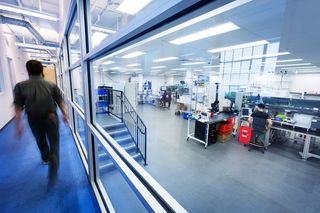
Nature-Inspired Factories Are the Future of Manufacturing (Op-Ed)

Bryan Johnson is an entrepreneur, investor and founder of the OS Fund and Braintree. Ginkgo Bioworks is an OS Fund company. Follow him on Twitter at @bryan_johnson. He contributed this article to Live Science's Expert Voices: Op-Ed & Insights.
A new type of foundry has moved into Boston Harbor, but it has no metal cutters or molten steel. In the 18,000-square-foot (1,672 square meters) facility, engineers churn out products ranging from scents and flavors to probiotics that fight antibiotic resistance. All of the custom-designed products come from an unlikely source: microorganisms.
Ginkgo Bioworks, part of the OS Fund, is one of a growing number of companies engineering technology with lessons from nature. Its founders are redesigning industrial engineering for a new generation — a manufacturing revolution powered by biology.
Synthetic biology goes mainstream
This nascent field, known as synthetic biology, is now at a place similar to where computers were in the 1950s and 1960s — slow, tedious and manual. But it is rapidly advancing and evolving with new technology: The industry is expected to reach $5.6 billion by 2018 — up from $1.9 billion in 2013.
Like many synthetic biology companies, Ginkgo's first commercially ready products are in the food and cosmetics industries, and they take a page from humanity's long history of culturing foods. Just like yeast is used to make wine and beer, scientists are using the natural processes of microorganisms to produce new flavors, nutrients and perfumes. [Probiotics' Future: 3 Promising Research Areas ]
But the company's vision is grander than consumer products: Collaborations include projects with the U.S. Department of Energy and the U.S. Defense Advanced ResearchProjects Agency to make microorganisms that fight disease and remove greenhouse gases from the air.
Sign up for the Live Science daily newsletter now
Get the world’s most fascinating discoveries delivered straight to your inbox.
It's a tall order, but by working to apply its technology across multiple levels of complexity — from food to carbon mitigation — these bioengineers hope to make a biological manufacturing method as reliable and predictable as the assembly lines that make cars or cellphones.

Manufacturing with life's blueprints
Biology is a powerful technology. How a plant self-assembles and uses water, air and sunlight to make food is downright magical compared to how people manufacture electronics. Bioengineers want to harness that power to design new technology from nature. They are writing a new code base for humanity, taking the programming of biology out of the realm of the unpredictable and into the predictable.
Ginkgo is part of a growing group of companies, such as Synthetic Genomics and Human Longevity, that are changing the way people think about nearly every aspect of life by reimagining the world's biological tool kit. These applied biologists are making organism engineering into a truly predictable engineering discipline.
Because DNA-based code comprises sequences of base pairs that repeat across organisms, researchers are now creating the tools and infrastructure needed to build new operating systems and applications using those codes. This is something computer software engineers have been doing for a long time, using 0s and 1s to create predictable outcomes in everything from airplane autopilot systems to credit card transaction processing.
Because of nature's complexity, biological code is not yet so predictable. For decades, biologists, geneticists and chemists have been working to unlock the secrets of genetics to make a universal biological programming language — one in which they can design organisms to perform specific functions in predictable ways.
Just in the last few years, scientists have made amazing breakthroughs, learning how to write and edit DNA code. Making this code more predictable will take time, and the effort will start in unlikely places — for example, in natural flavors and scents.
Scaling up nature's assembly lines
Traditionally, making a scented rose oil has required more than 1,000 petals to be harvested, collected and pressed to produce a small bottle of perfume. Through Ginkgo's organism design process, scientists are taking the genes from roses, transferring them into yeast and growing it in a fermenter to produce rose oil in a process akin to beer brewing. [Engineers Follow Mother Nature's Lead on Keeping Clean]
Speeding the scaling of such processes are banks of robotic technologies for engineering the biological cells — work that used to be performed by an army of Ph.D.s. Researchers can instead spend their time doing the hard work of designing and customizing cells to solve specific problems.

Another application of synthetic biology aims to tackle a pressing problem for humanity: antibiotic-resistant superbugs. Antibiotic resistance is responsible for an estimated 700,000 deaths per year, according to a recent Wellcome Trust/UK report. And yet, pharmaceutical companies are moving away from antibiotic development.
What if, instead of trying to create new antibiotics, bioengineers found a way to remove the antibiotic-resistant genes? Penicillin, for example, works well — just not against infectious bacteria that have the genes for penicillin resistance. Researchers are working to design new types of probiotics by engineering bacteria that can target and remove bacteria with harmful traits such as antibiotic resistance.
The time for synthetic biology, to pursue our best opportunities and solve our greatest challenges, has arrived — it opens up an entirely untapped world of solutions for humanity.
Follow all of the Expert Voices issues and debates — and become part of the discussion — on Facebook, Twitter and Google+. The views expressed are those of the author and do not necessarily reflect the views of the publisher. This version of the article was originally published on Live Science.
